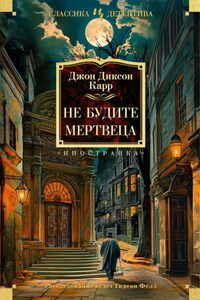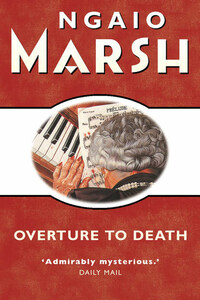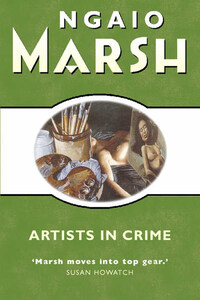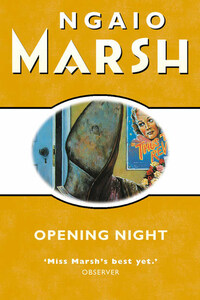This novel is entirely a work of fiction. The names, characters and incidents portrayed in it are the work of the authorâs imagination. Any resemblance to actual persons, living or dead, events or localities is entirely coincidental.
Harper
An imprint of HarperCollinsPublishers Ltd.
1 London Bridge Street
London SE1 9GF
www.harpercollins.co.uk
First published in Great Britain by Ngaio Marsh Ltd 1958
Copyright © 1958 Ngaio Marsh Ltd
Ngaio Marsh asserts the moral right to be identified as the author of this work
A catalogue copy of this book is available from the British Library
All rights reserved under International and Pan-American Copyright Conventions. By payment of the required fees, you have been granted the non-exclusive, non-transferable right to access and read the text of this ebook on-screen. No part of this text may be reproduced, transmitted, downloaded, decompiled, reverse engineered, or stored in or introduced into any information storage and retrieval system, in any form or by any means, whether electronic or mechanical, now known or hereinafter invented, without the express written permission of HarperCollins ebooks
HarperCollinsPublishers has made every reasonable effort to ensure that any picture content and written content in this ebook has been included or removed in accordance with the contractual and technological constraints in operation at the time of publication
Source ISBN: 9780006159582
Ebook Edition © OCTOBER 2009 ISBN: 9780007344741 Version: 2016-08-30
CHAPTER 1
Prologue with Corpse
In the Pool of London and farther east all through the dockyards the fog lay heavy. Lights swam like moons in their own halos. Insignificant buildings, being simplified, became dramatic. Along the Cape Line Companyâs stretch of wharfage the ships at anchor loomed up portentously: Cape St Vincent, Glasgow. Cape Horn, London. Cape Farewell, Glasgow. The cranes that served these ships lost their heads in the fog. Their gestures as they bowed and turned became pontifical.
Beyond their illuminated places the dockyards vanished. The gang loading the Cape Farewell moved from light into nothingness. Noises were subdued and isolated and a manâs cough close at hand was more startling than the rattle of winches.
Police Constable Moir, on duty until midnight, walked in and out of shadows. He breathed the soft cold smell of wet wood and heard the slap of the night tide against the wharves. Acres and acres of shipping and forests of cranes lay around him. Ships, he thought romantically, were, in a sort of way, like little worlds. Tied up to bollards and lying quiet enough but soon to sail over the watery globe as lonely as the planets wandering in the skies. He would have liked to travel. He solaced himself with thoughts of matrimony, promotion and, when the beat was getting him down a bit, of the Police Medal and sudden glory. At a passageway between buildings near the Cape Farewell he walked slower because it was livelier there. Cars drove up: in particular an impressive new sports car with a smashing redhead at the wheel and three passengers, one of whom he recognized with interest as the great TV personality, Aubyn Dale. It was evident that the others, a man and woman, also belonged to that mysterious world of glaring lights, trucking cameras and fan mails. You could tell by the way they shouted âdarlingâ at each other as they walked through the passageway.
PC Moir conscientiously moved himself on. Darkness engulfed him, lights revealed him. He had reached the boundary of his beat and was walking along it. A bus had drawn up at the entry to the waterfront and he watched the passengers get out and plod, heads down and suitcases in hand, towards the














